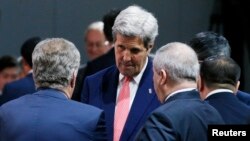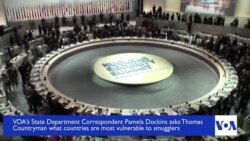Senior U.S. officials say it is “unfortunate” Russia chose not to attend the Nuclear Security Summit, but that Washington will continue bilateral and multilateral discussions with Moscow on fighting nuclear terrorism and the effort to remove international stocks of highly enriched uranium.
Separately, Assistant Secretary of State Thomas Countryman told VOA in an interview Friday that the U.S. and other world powers hoped to adopt concrete measures that would help ensure nuclear safety.
"It is not just adding urgency, it is also specific concrete improvements in the protection of nuclear material around the world so that terrorists can not steal that dangerous material," he said.
On the matter of Russian-U.S. cooperation, Countryman said both countries were faithfully implementing their agreement to reduce nuclear weapons stockpiles to as close to zero as possible.
By 2018, the two countries will reduce their nuclear arsenals by 80 percent from the levels that had been reached "at the height of the Cold War," Countryman told reporters during a briefing at the summit.
WATCH: Two U.S. officials talk about nuclear security
Countryman said the risk that nuclear material could fall into terrorists' hands, and possibly be used in "dirty bombs," was a main topic at Friday's final sessions of the two-day summit. U.S. officials stressed the need for "concrete, practical results" that can be achieved through international cooperation on the issue, he added.
This round of nuclear security talks included, for the first time, a special session on preventing nuclear materials from falling into the hands of terrorists such as the Islamic State group.
Not overshadowed
U.S. Secretary of State John Kerry said Friday that he did not think the summit was overshadowed by concerns about IS terrorism, although he noted the United States remained concerned about any extremists acquiring nuclear materials for possible conversion into weapons.
Kerry discussed the nuclear terrorism issue during a meeting with the European Union's top foreign policy official, Federica Mogherini, on the sidelines of the summit.
Ambassador Bonnie Jenkins, who coordinates U.S. participation in nuclear threat reduction programs, said the United States was continuing to work with China on preventing North Korea from developing its nuclear program any further.
Jenkins said regional centers have been established in Asia to train professionals in various aspects of nuclear security. “There is one in China, one in South Korea and one in Japan, and the three countries have established something called Asian Network" in which they are collaborating, she said.
She told VOA the U.S. was increasingly focused on trying to prevent attacks by militant groups.
"There is a lot more focus now on nonstate actors, particularly because it is such a difficult threat. You have to follow people. You have to follow money and what people can carry with them and what they can take on a plane, and so it is a lot more of a challenge," she said.
Since the last nuclear security summit in 2014, Russia, Uzbekistan and Switzerland have closed several of their nuclear reactors that produced highly enriched uranium. In addition, Obama administration officials said, Indonesia, Germany and other countries have begun reducing their stockpiles of nuclear material, with a goal of eliminating them.






